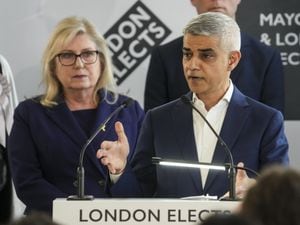Cleverly: Ministers won’t be distracted from compensating wronged subpostmasters
The Home Secretary hit back at the Post Office after it said it stood by more than 350 prosecutions in the Horizon scandal.

Home Secretary James Cleverly has said the Government will not be “distracted or deterred” from providing compensation to wronged subpostmasters, after the Post Office said it stood by more than 350 Horizon scandal prosecutions.
It comes after Post Office chief executive Nick Read said in a letter to the Government last month that his organisation would oppose appeals in more than half the cases.
Writing to Justice Secretary Alex Chalk, Mr Read said the company “would be bound to oppose an appeal” in at least 369 of the 700 cases it had prosecuted.
But Mr Cleverly told Sky News on Friday: “That letter is not going to divert us from what we know to be the right course of action, which is do the right thing by hard-working people who found themselves, through no fault of their own, being targeted for criminal actions.
“So we are relentlessly focused on that, and that exchange won’t change that at all.”
A No 10 spokeswoman told reporters: “We remain undeterred in our plans that we set out.
“We think it’s right that we take what is an extraordinary step to overturn convictions.
“This was one of the greatest miscarriages of justice in our nation’s history, so we continue to work to deliver that swiftly.”
Mr Read’s letter, sent shortly after the ITV drama Mr Bates vs The Post Office sparked public outrage, said the cases “involve convictions obtained by reliance on evidence unrelated to the Horizon computer system” and represented a “much more significant” proportion of the prosecutions than those the company was likely to concede in court.
The Post Office denied the letter, first reported by The Guardian, had been intended to persuade ministers against a mass exoneration of subpostmasters, and said it was sent “without any value judgment on what the correct course of action might be”.
Referring to plans to accelerate the exoneration of subpostmasters convicted during the Horizon scandal, Mr Read said the Post Office “has a duty to ensure that any decisions which may be taken by the Government are fully informed”.
He said the reliance on other evidence in the 369 cases “clearly raises acute political, judicial and communications challenges against the very significant public and parliamentary pressure for some form of acceleration or bypassing of the normal appeals process”.
In an attached note from lawyers Peters and Peters, solicitor Nick Vamos said it was “highly likely that the vast majority of people who have not yet appealed were, in fact, guilty as charged and were safely convicted”.
He added: “Unless this is made clear to the Government, it risks making incredibly important and expensive decisions on a completely false premise.

“I am sure this point has been or is being made to whoever is briefing Alex Chalk, but I also know that points can be misunderstood or watered down by the time they reach a minister, and this is one point that cannot be made strongly enough.”
The Post Office said the legal note was “not solicited” by the company and “was sent to express the personal views of its author”.
In a statement on its website, the Post Office said: “Post Office was in no way seeking to persuade the Government against mass exoneration.
“Post Office are fully supportive of any steps taken by Government to speed up the exoneration of those with wrongful convictions and to provide redress to victims, with the information having been provided to inform that consideration.”
The publication of the letter on the Post Office’s website came as business minister Kevin Hollinrake announced further details of planned legislation to exonerate subpostmasters convicted during the Horizon scandal.
As well as requirements relating to people eligible for exoneration under the legislation, Mr Hollinrake said those affected would have to sign a statement to the effect that they did not commit the crime for which they were convicted before they could receive financial redress.
If they were subsequently found to have signed the statement falsely, Mr Hollinrake said they “may be guilty of fraud”.
He added: “As noted in my statement on 10 January, the legislation is likely to exonerate a number of people who were, in fact, guilty of a crime. The Government accepts that this is a price worth paying in order to ensure that many innocent people are exonerated.”
According to Mr Read’s letter, the 369 cases were identified as part of work undertaken to “identify potential appeals against convictions which… we would be highly likely to concede in court”.
The work conducted by Peters and Peters identified 30 potential cases, on top of the 142 already resolved and five awaiting consideration, along with 132 cases where the Post Office said more information was needed.
In his letter, Mr Read said: “We make absolutely no value judgment about what you and your colleagues determine as the right course of action, but consider it essential for you to understand the very real and sensitive complexities presented (in) each case.”





